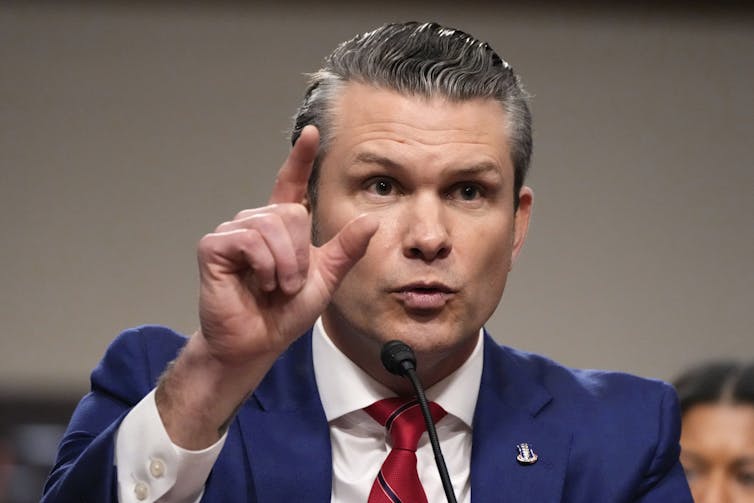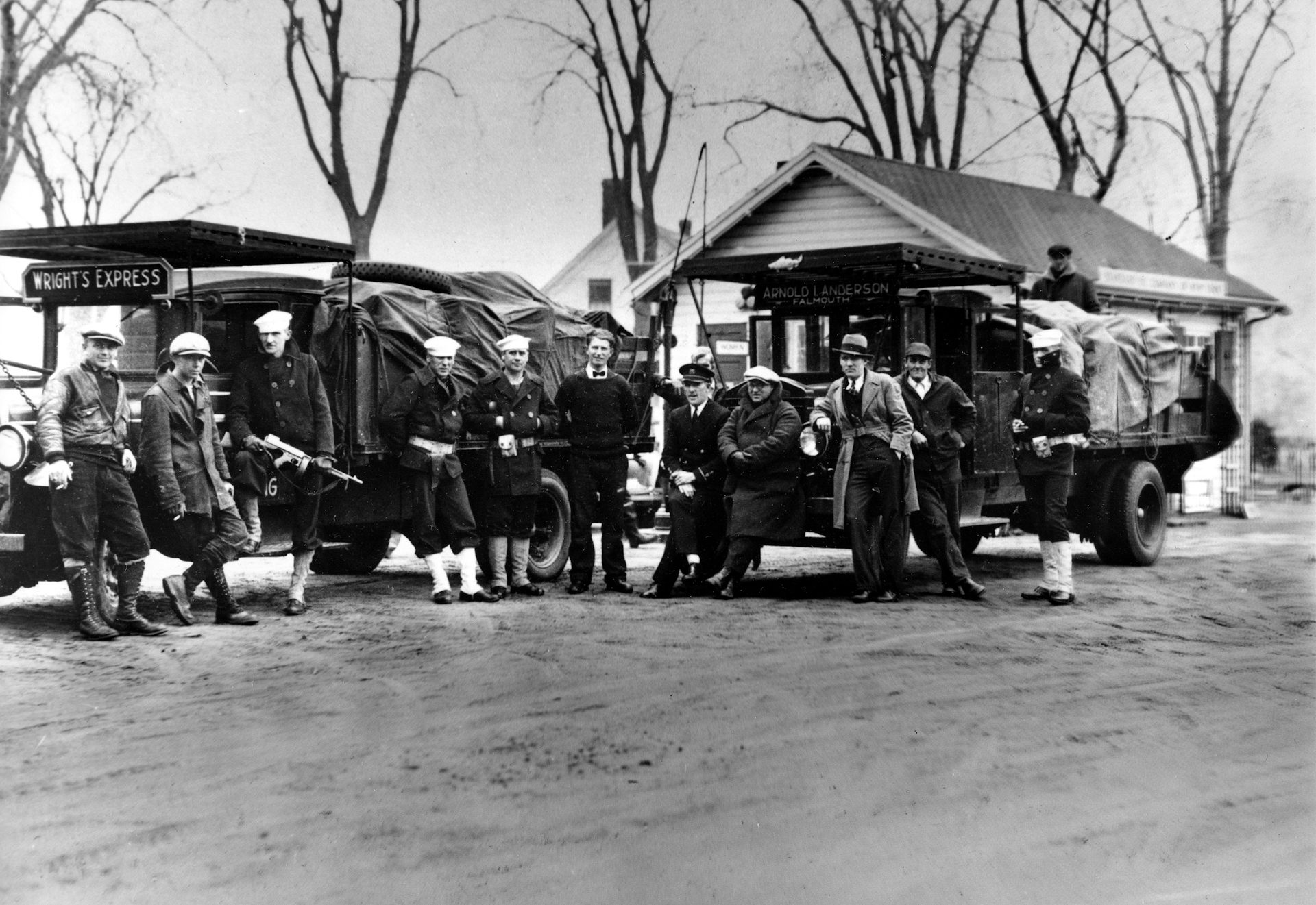What is CREC? The Christian nationalist group has a vision for America − and Defense Secretary Pete
The Communion of Reformed Evangelical Churches, or the CREC, has a highly patriarchal and conservative interpretation of Scripture.

Defense Secretary Pete Hegseth’s affiliation with the Communion of Reformed Evangelical Churches – commonly called the CREC – drew attention even before his confirmation hearings in January 2025. More recently, media reports highlighted a Pentagon prayer led by Hegseth and his pastor, Brooks Potteiger, in which they praised President Donald Trump, who they said was divinely appointed.
As a scholar of the Christian right, I have studied the CREC. Hegseth’s membership in a church that belongs to the CREC drew attention because prominent members of the church identify as Christian nationalists, and because of its positions on issues concerning gender, sexuality and the separation of church and state.
The CREC is most easily understood through three main parts: churches, schools and media.
What is the CREC?
The CREC church is a network of churches. It is associated with the congregation of Doug Wilson, the pastor who founded Christ Church in Moscow, Idaho. Wilson grew up in the town, where his father was an evangelical minister.
Wilson co-founded the CREC in 1993 and is the public figure most associated with the network of churches. Christ Church operates as the hub for Logos Schools, Canon Press and New Saint Andrews College, all located in Moscow. Logos is a set of private schools and homeschooling curriculum, Canon Press is a publishing house and media company, and New Saint Andrews College is a university, all of which were founded by Wilson and associated with Christ Church. All espouse the view that Christians are at odds with – or at war with – secular society.
While he is not Hegseth’s pastor, Wilson is the most influential voice in the CREC, and the two men have spoken approvingly of one another.

As Wilson steadily grew Christ Church in Moscow, he and its members sought to spread their message by making Moscow a conservative town and establishing churches beyond it. Of his hometown, Wilson plainly states, “Our desire is to make Moscow a Christian town.”
The CREC doctrine is opposed to religious pluralism or political points of view that diverge from CREC theology. On its website, the CREC says that it is “committed to maintaining its Reformed faith, avoiding the pitfalls of cultural relevance and political compromise that destroys our doctrinal integrity.”
CREC churches adhere to a highly patriarchal and conservative interpretation of Scripture. Wilson has said that in a sexual relationship, “A woman receives, surrenders, accepts.”
In a broader political sense, CREC theology includes the belief that the establishment clause of the Constitution does not require a separation of church and state. The most common reading of the establishment clause is that freedom of religion precludes the installation of a state religion or religious tests to hold state office.
The CREC broadly asserts that the government and anyone serving in it should be Christian. For Wilson and members of CREC churches, this means Christians and only Christians are qualified to hold political office in the United States.
Researcher Matthew Taylor explained in an interview with the Nashville Tennessean, “They believe the church is supposed to be militant in the world, is supposed to be reforming the world, and in some ways conquering the world.”
While the CREC may not have the name recognition of some large evangelical denominations or the visibility of some megachurches, it boasts churches across the United States and internationally. The CREC website claims to have over 130 churches and parishes spread across North America, Europe, Asia and South America.
Like some other evangelical denominations, the CREC uses “church planting” to grow its network. Plant churches do not require a centralized governing body to ordain their founding. Instead, those interested in starting a CREC congregation contact the CREC. The CREC then provides materials and literature for people to use in their church.
CREC schools, home schools and colleges
The CREC’s expansion also owes a debt to Wilson’s entrepreneurship. As the church expanded, Wilson founded an associated K-12 school called “Logos” in September 1981, which since then has grown into a network of many schools.
In conjunction with its growth, Logos develops and sells “classical Christian” curriculum to private schools and home-school families through Logos Press. Classical Christian Schools aim to develop what they consider a biblical worldview. In addition to religious studies, they focus on classic texts from Greece and Rome. They have grown in popularity in recent years, especially among conservatives.
Logos’ classical Christian curriculum is designed to help parents “raise faithful, dangerous Christian kids who impact the world for Christ and leave craters in the world of secularism.” Logos press regularly asserts, “education is warfare.”
According to the website, Logos schools enroll more than 2,000 students across 16 countries. Logos also has its own press that supplies the curriculum to all of these schools. On the heels of Logos’ success, Wilson founded the Association of Classical Christian Schools in 1993 as an accrediting body for like-minded schools. The ACCS now boast 500 schools and more than 50,000 students across the United States and around the world.
Additionally, Wilson founded New Saint Andrews College in Moscow, Idaho. New Saint Andrews is a Christian university that takes the classical Christian approach to education championed by Wilson into higher education.
The New Saint Andrews College is consistent with other CREC institutions. It considers secularism a weakness of other universities and society more generally. Its website explains: “New Saint Andrews has long held a principled and clear voice, championing the truth of God’s word and ways, while so many other colleges veer into softness and secularism.” The school is governed by the elders of Christ Church and does not accept federal funding.
CREC media
In addition to the Logos Press, which produces the CREC school curriculum, Wilson founded Canon Press. Canon Press produces books, podcasts, a YouTube channel and assorted merchandise including apparel and weapons, such as a flamethrower. The YouTube channel has over 100,000 followers.
Books published by Canon include children’s picture books to manuals on masculinity. A number of books continue the theme of warfare.
The politics page of the press contains many books on Christian nationalism. Christian political theorist Stephen Wolfe’s book “The Case for Christian Nationalism” is one of the most popular among books on Christian nationalism. The website has dozens of books on Christian nationalism and media dedicated to the construction of a Christian government.
Author Joe Rigney, a fellow of theology at New Saint Andrews College and an associate pastor at Christ Church, warns of the “Sin of Empathy.” Rigney claims that empathizing with others is sinful because it requires compromise and makes one vulnerable in the fight against evil.
CREC controversies

As the church network has grown, it has drawn attention and scrutiny. Wilson’s 1996 publication of a book positively depicting slavery and claiming slavery cultivated “affection among the races” drew national attention.
Accusations of sexual abuse and the church’s handling of it have also brought national news coverage. Vice’s Sarah Stankorb interviewed many women who talked about a culture, especially in marriage, where sexual abuse and assault is common. The Vice reporting led to a podcast that details the accounts of survivors. In interviews, Wilson has denied any wrongdoing and said that claims of sexual abuse will be directed to the proper authorities.
Hegseth’s actions as secretary of defense concerning gender identity and banning trans people from serving in the military, in addition to stripping gay activist and politician Harvey Milk’s name from a Navy ship, have brought more attention to the CREC. I believe that given Hegseth’s role as secretary of defense, his affiliation with the CREC will likely remain a topic of conversation throughout the Trump presidency.
Samuel Perry does not work for, consult, own shares in or receive funding from any company or organization that would benefit from this article, and has disclosed no relevant affiliations beyond their academic appointment.
Read These Next
After a 32-hour shift in Pittsburgh, I realized EMTs should be napping on the job
A paramedic and university professor shares data about how strategic napping could help his own health…
Enforcing Prohibition with a massive new federal force of poorly trained agents didn’t go so well in
Both Prohibition and current mass deportation efforts were hastily built, staffed by people permitted…
Trump administration axed nutrition education program that saved more money than it cost, even as go
Every dollar spent on community health education through SNAP-ED saved an estimated $10.64 in Medicaid…






